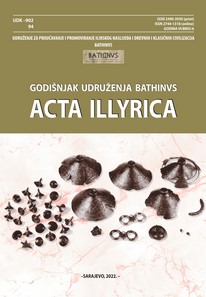L’accusatio iure mariti vel patris e l’accusatio publica o iure extranei nella criminalizzazione augustea degli illeciti sessuali. Persistenze e innovazioni nel diritto romano cristiano
Accusation iure mariti vel patris or iure estranei in Augustan criminalization of unpermitted sextual acts. The survival and novelties in Christian Roman law
Author(s): Giovanni Brandi CORDASCO SALMENA DI SAN QUIRICOSubject(s): Christian Theology and Religion, History of Law, Criminal Law, Canon Law / Church Law, Roman law
Published by: Udruženje za proučavanje i promoviranje ilirskog naslijeđa i drevnih i klasičnih civilizacija “BATHINVS”
Keywords: adultery; accusatio; ius occidendi; intermediate and contemporary persistences;
Summary/Abstract: The patriarchal structure of the family, and the need for the ancient gentes to continue without whirlwinds or bloodshed, also in function of the public positions that follow, first of all that of citizenship, imposed on Rome, but previously on the most ancient civilizations of the Mediterranean, the formation of nuclei capable of being based only on monogamous marriage: on the obligation of fidelity, which, although serious in equal measure on both spouses, behind the profile of protection, is clearly asymmetrical. The violation of the marital fidelity assumed importance only if attributable to the woman while the adultery of the husband is ignored by law. The term adulterium, to be adulterated, qualifies, properly, the sexual betrayal of a nupta with a person other than her husband. The severe morality that has invested the roman society following the advent of Augustus, has made these criteria even more rigid; the Lex Iulia de adulteriis coercendis has placed the cornerstones of a singular repression of sexual offences. While before, the adultery of the woman was considered within the family, subsequently the italian legal system asked for its punishment as crimen publicum through a specialized and competent court: even the man, with whom the married woman committed the fact, takes on the robe of an offender. In the proceedings two distinct accusations come together: the accusatio iure mariti vel patris and the accusatio publica or iure extranei, which account of the augustean system both with reference to the rights of the father and the husband, exclusive right holders of the right to prosecute, both with regard to the exercise of public action. The basis of the action lies in the relationship that binds close relatives to the woman, such that adulterium acts as an iniuria towards them. The accusatio publica or iure extranei, on the other hand, takes the form of a power of substitution, exercisable only when the pater or maritus are inactive at the end of the established period. The elements provided by the Lex Iulia make it possible to define the contours of a discipline, imposed so rigidly as to survive, though with the changes of Justinian law, both to common and to modern law, justifying, among other things, the murder because of honor, which, surprisingly, has been maintained in the italian legal system until 1981.
Journal: Godišnjak Udruženja BATHINVS “Acta Illyrica”
- Issue Year: 6/2022
- Issue No: 6
- Page Range: 99-137
- Page Count: 39
- Language: Italian

